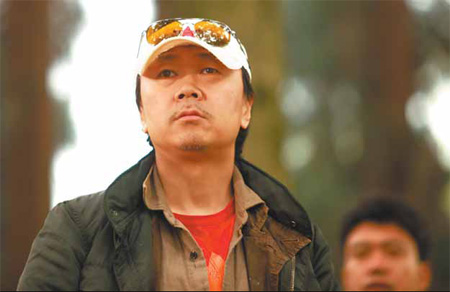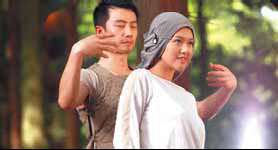Chinese rock icon Cui Jian directs film
|
 |
|
Chinese rock icon Cui Jian says making film has refreshed his creativity. [China Daily] |
Legendary Chinese rocker Cui Jian refuses to make more music unless he has new inspiration - something he is finding by swapping his spot on stage for a film director's chair.
"When some stars run out of passion to create something new, they turn to the restaurant business or to drugs I have seen so many of them go that way," he says.
"I'm instead turning to filmmaking. While I'm not very good at it, it refreshes my creativity and recharges my battery."
Cui's film is set in Chengdu, capital of Sichuan province, in 2029, 21 years after the Sichuan earthquake. A girl finds a boy who saved her life during the disaster only to discover he's the same person who severely hurt her younger brother.
While the plot sounds melodramatic, Cui says the storyline isn't the flick's driving force.
"Many people might disagree, but I instead focus on the feel or atmosphere," he says. "There are already so many storyline-driven films, and I can't make a better one."
He says power is a theme that he is obsessed with.
"Earthquakes that don't kill people have a charm to their power. And love and hate are about power, too."
 |
|
Actor Huang Xuan and actress Tan Weiwei play in Cui Jian's film which is part of the "Chengdu, I Love You project." [China Daily] |
The film is part of the "Chengdu, I Love You" (Chengdu, Wo Ai Ni) project, which is inspired by an acclaimed series of short films about Paris and New York. It premiered at the Venice festival in September. "I was not making it just for fun," Cui says.
He dislikes many people's interpretation of his 30-minute flick.
"Making a film is like making a dream come true, and it's magical to see your dream become visible on the screen," he says.
Born in 1961 to a military orchestra trumpeter and dancer, Cui often slipped into army cinemas as a young boy.
He identifies a dichotomy among films - those that make you "fly with them" and those that don't.
He places "The Godfather," "Once Upon a Time in America" and "No Country for Old Men" in the first category.
He has befriended some of China's most avant-garde directors, such as Jiang Wen and Zhang Yuan.
He guest-starred in Zhang's "Beijing Bastards" (Beijing Zazhong), in which he played himself. The film about rockers, poor painters and underground bands living outside the mainstream was never screened in China. When the film faced financial difficulties, Cui spent about 200,000 yuan (US$29,000) of his own money to help fund the production.
He played a music teacher in Yu Zhong's "Roots and Branches" (Wode Xiongdi Jiemei). But he doesn't like the film, because he believes the ending should have been thought provoking rather than simply happy.
He also appears for a few minutes in Jiang's 2007 film "The Sun Also Rise"s (Taiyang Zhaochang Shengqi), playing a thinker who guides the hero.
In the same year, he directed an eight-minute short film called "The Era of Amending the Hymen" (Xiufu Chun Mo Shidai). The film fiercely criticizes traditional Chinese conceptions of women's chastity. Available only online, the film received tens of millions of views but mixed reviews.
His director friends assisted him with the screenplay of Chengdu and advised that he watch more films.
"We actually didn't talk a lot, but I can feel their encouragement; they are generous people," Cui recalls.
In the film, Cui not only pays tribute to the quake-devastated city, but also elaborates upon his understandings of music, dance and kungfu.
But the movie wasn't well received at the Venice Film Festival.
Variety calls it a "laughably inept opening seg". Some critics say it's broken, and tries to address too many things.
Cui accepts responsibility for these shortcomings.
"I'm not capable or experienced enough to make a film," he says.
 0
0 







Comments